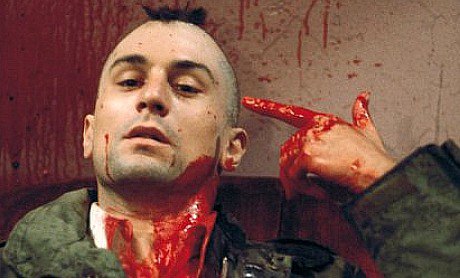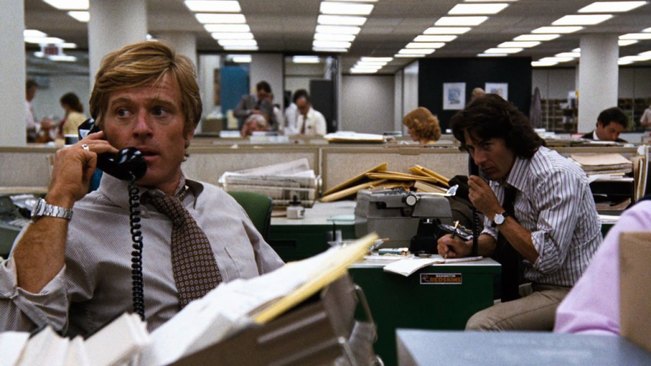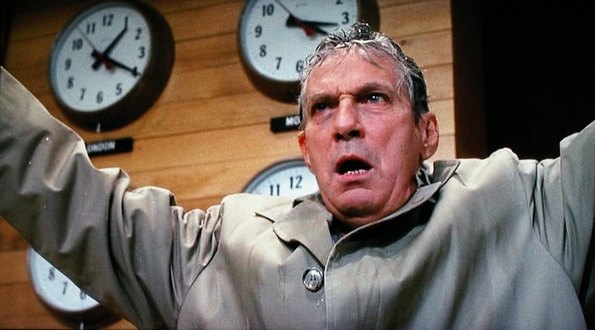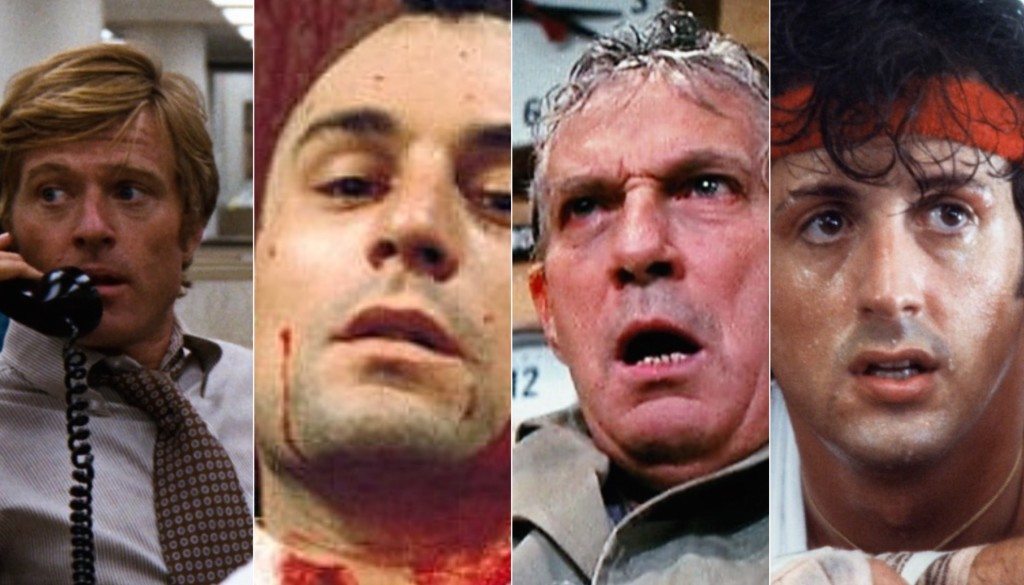It was close to this time, forty years ago, I sat in the old Odeon Cinema in downtown Oshawa to watch Martin Scorsese’s alarming Taxi Driver (1976) unspool onto the screen. I was 16 years old, looked older, got into restricted films with ease and took advantage of that. It was an exciting time to be a movie junkie, directors had taken Hollywood by storm and there was a youth movement shaking up the American cinema. Woody Allen, Coppola, Lumet, Pollack, Scorsese, Spielberg, Altman, Lucas, Ashby, Kubrick, Friedkin, Pakula….so many great directors, so many great films.
Scorsese was at that time an up and coming director of the moment, Mean Streets (1973) and Alice Doesn’t Live Here Anymore (1974) being critically acclaimed films that turned all eyes to the filmmaker. The star of the film was the recent Oscar winning actor Robert De Niro, honored with an award for Best Supporting Actor for The Godfather Part II (1974) in which he portrayed to utter perfection the young Don Vito Corleone, portrayed in the first film by Marlon Brando as a seventy year old man.
I knew to expect something dark, instead what I received was transformational.
 The film captured what New York City was before the big clean up, which was a sewer of pimps, prostitutes, drugs and crime. The sewer grate seems to be holding back hell, smoldering below, from exploding onto the streets, the hot steam rising as though from Hades.
The film captured what New York City was before the big clean up, which was a sewer of pimps, prostitutes, drugs and crime. The sewer grate seems to be holding back hell, smoldering below, from exploding onto the streets, the hot steam rising as though from Hades.
De Niro was brilliant as Travis Bickle, alarming in his intensity, a deeply disturbed former Vietnam veteran, a ticking time bomb who makes the decision he is going to clean the city up by murdering a senator. Through the deranged eyes and mind of Travis we see the film unfold, watching his descent into insanity, his disconnection from the real world, until the inevitable slaughter after which he is declared a hero, though we know better. That last glimpse of his eyes in the rear view mirror tells us he is going to go off again; that once again the time bomb is ticking.
Matching De Niro step for step throughout the film is Jodie Foster portraying Iris a twelve year old hooker who knows something is very wrong with Travis but is too young to put her finger on it. As her pimp, Harvey Keitel brings the right amount of swagger and sense of danger to the role, as does Peter Boyle as Wizard a wise old cab driver who really knows nothing at all and knows it.
Scorsese’s camera prowls the streets of New York City in a way no previous camera ever had, going in and out of its most seedy locations and bringing to us a city about to fall. It was terrifying, yet brilliant on so many levels, earning many awards — though it was De Niro most often singled out as Best Actor. Though the DGA nominated Scorsese as Best Director, he was snubbed by the Academy despite an Oscar nomination for Best Picture.
Around the same time, I saw Alan J. Pakula’s astonishing All the President’s Men (1976) — a superb exploration of how Bob Wodward and Carl Bernstein, reporters for the Washington Post brought down a presidency reporting the Watergate scandal. Produced by Robert Redford who bought the rights to the book before it was even finished, the actor assembled a crack team to create a thriller, giving the film an edge, a darkness that others might not have brought to the work. Pakula was a top notch director, and like Hal Ashby, he was one of the great under appreciated filmmakers of the seventies; the tension he brought to the picture was overwhelming. One of the greatest shots in movie history shows the two reporters going through index cards in the Library of Congress and the camera pans up and up and up until they look like insects in a mammoth hive trying to get done what they need done.
 Not only is the film to this day the very best movie ever made about reporting, it was the year’s best film. Best Picture honors came from the National Society of Film Critics and the New York Film Critics, with Jason Robards the consistent choice as Best Supporting Actor. The screenplay, adapted from the book brilliantly by William Goldman, details how the reporters uncovered the case and followed the path to the White House.
Not only is the film to this day the very best movie ever made about reporting, it was the year’s best film. Best Picture honors came from the National Society of Film Critics and the New York Film Critics, with Jason Robards the consistent choice as Best Supporting Actor. The screenplay, adapted from the book brilliantly by William Goldman, details how the reporters uncovered the case and followed the path to the White House.
That fall I watched with great interest Sidney Lumet’s darkly funny study of the television news Network (1976) which strangely foreshadowed reality television twenty five years later. The blackest of comedies yet, also a superb satire, Network explores what occurs when a TV news anchor goes mad and announces himself as a latter day prophet on the air-waves. Portrayed as a raging lion in his winter years by Peter Finch the film is a scathing attack on the inhumanity and lack of empathy for those working in TV.
 The performances are electrifying, from Finch as the raging anchor, Faye Dunaway as the ball breaking producer Diana, William Holden in a career best performance as the head of the news until fired, Robert Duvall as the satanic head of the network, Ned Beatty as the God like owner of the network who speaks to Finch as though he were God, and in a stunning cameo Beatrice Straight as Holden’s wounded wife. Finch, Dunaway and Straight won Oscars that year, dominating the awards, adding a screenplay win for Paddy Chayevsky for his biting perfect story.
The performances are electrifying, from Finch as the raging anchor, Faye Dunaway as the ball breaking producer Diana, William Holden in a career best performance as the head of the news until fired, Robert Duvall as the satanic head of the network, Ned Beatty as the God like owner of the network who speaks to Finch as though he were God, and in a stunning cameo Beatrice Straight as Holden’s wounded wife. Finch, Dunaway and Straight won Oscars that year, dominating the awards, adding a screenplay win for Paddy Chayevsky for his biting perfect story.
Of course Rocky (1976) won best picture, famously, leaving three of the greatest films of the seventies left out in the cold. However history has been kind to them and they remain stunning works of art, the very best of the seventies, and represent everything that was good and exciting about cinema at that time in history.
Read More: The 20 Best Movies of 1970s


You must be logged in to post a comment.